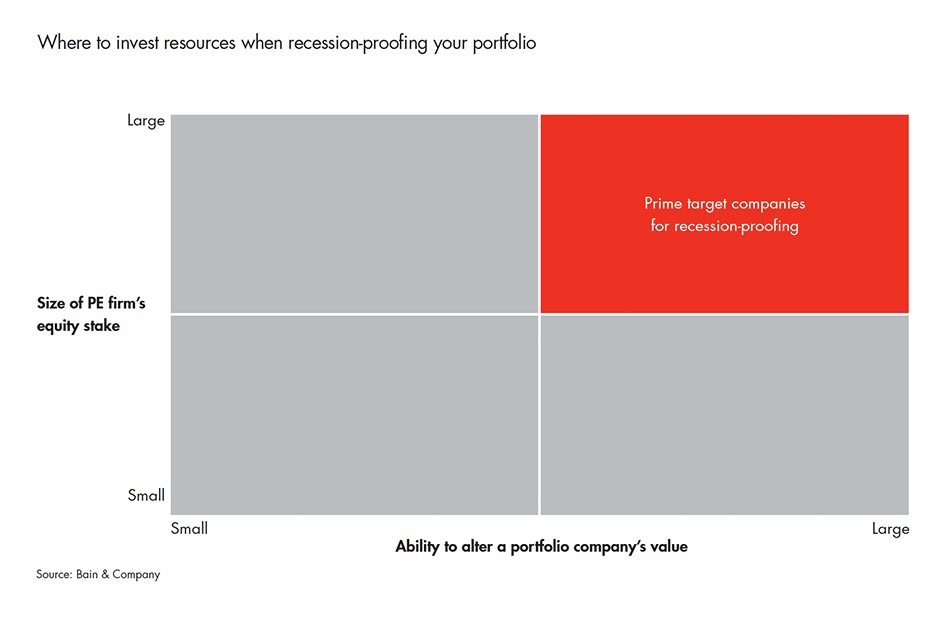Forbes.com
This article originally appeared on Forbes.com.
As every private equity investor who has weathered past turns of the business cycle knows, recessions have a powerful way of concentrating the mind. For those nimble and adaptable enough to fortify themselves against inevitable economic headwinds, a recession can be a time to shore up portfolios and seize new opportunities.
As we explain in Bain & Company’s recently released Global Private Equity Report 2016, general partners (GPs) may soon find themselves facing the test. With the economies of most developed countries struggling, China in the grips of a major slowdown and the aging US expansion staggering toward its seventh anniversary, the period ahead could see the stalling of global growth.
The timing of recessions is hard to predict, but PE firms should prepare for a downturn before the storm hits. (No one wants to fix a leaking roof during a hurricane.) Portfolio assets acquired within the past two or three years are particularly susceptible to buffeting by economic turbulence. Purchased at prevailing high multiples and under sunny economic skies, many of these holdings were set up for exit sooner than later. But as recession clouds gather, GPs are likely to end up keeping many of these holdings until exit channels open up with a recovery.
GPs that remain stewards of their assets for longer than they had expected will want to weigh how best to insulate them from economic headwinds and to set them up to prosper when conditions improve. Since it is difficult to devote adequate resources to recession-proof every asset in their portfolio, GPs will need to do some basic triage as a first step in determining where and how to intervene. One effective way to identify which holdings should be the focus of their efforts is to sort a fund’s deals by the size of the fund’s equity investment and by the GP’s ability to enhance the value of a given asset. Assets that cluster in the upper right-hand quadrant should be the prime candidates for funds’ recession-proofing efforts (see figure).

Refresh your due diligence. To size up the vulnerabilities a holding may face in a weaker economy, it pays to revisit two issues: whether the potential that originally made it an attractive investment still prevails and what course corrections to the value-creation plan may be needed to position the asset to ride out a downturn. GPs that do this well examine both cost-reduction and revenue-enhancement adjustments their portfolio company can take now to squeeze everything they can out of their top and bottom lines. Putting every aspect of operations under a cost X-ray, they look for ways to work with suppliers and cut overhead to maximize savings, which will reduce pressure on EBITDA growth. They then look for opportunities to strengthen EBITDA and cushion their portfolio company’s bottom line against slower demand by undertaking a revenue hunt to turn up ways to boost topline growth, for example, by identifying low-cost service enhancements or reexamining pricing and discount policies.
Tighten up the balance sheet. The period heading into an economic slowdown is also a crucial time for GPs to scrutinize the balance sheets of their priority portfolio companies, with the principal goal of optimizing their capital structure. Smart GPs will explore ways to tap still-accommodating credit markets to refinance portfolio-company debt with covenant-lite loans or bonds that will pinch less if a recession hits. Recognizing that exit conditions may deteriorate in the period ahead, they also look for opportunities to de-risk their investments by freeing up cash from the balance sheet and using it to pay down debt.
In the next installment of this series, we will explore how leading PE firms determine where they will put capital to work in a slowing economy.
Hugh MacArthur, Graham Elton, Dan Haas and Suvir Varma are leaders of Bain & Company’s Private Equity Group.
Carl Evander is a principal in Bain’s Private Equity Group.
